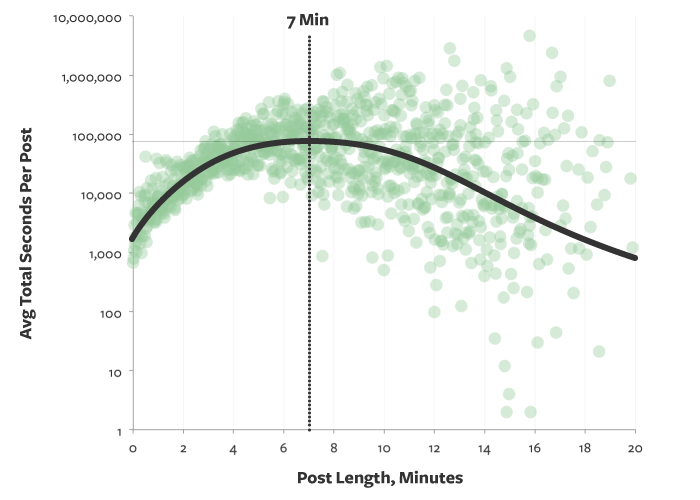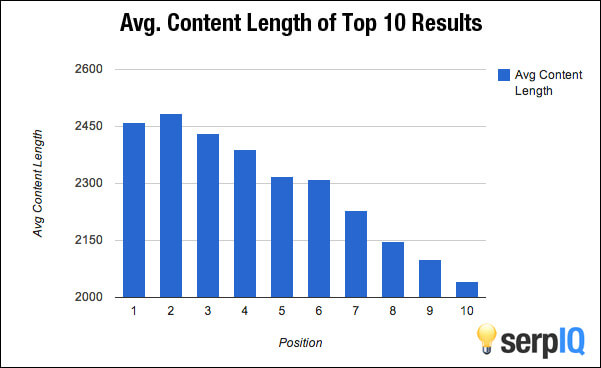What’s the Ideal Word Count for your Blog?
By Simon Brooks, 4 September 2015
One of the most frequently asked questions among marketers who include blogs and articles in their marketing plans is “How long should my blog or article be?”
The answer seems to be something of a grey area, with staunch advocates fighting the corner for both short and long features.
Yet grey doesn’t mean no answer. It just depends what your goals are, who your intended readers are and what your subject matter is (among other factors).
So as there’s no single definitive answer to the question of ideal blog length, let’s have a look at some of the factors, pros and cons that might influence your ‘ideal’ blog word count.
Ultimately, it’s about which approach works best for you.
The Case for Shorter Blog Posts
Short posts of around 300 – 500 words can be used very successfully where the goal is to drive sales, newsletter registrations or webinar sign-ups.
The shorter format lends itself perfectly to this as it draws more attention to the action you want the reader to take.
As this graphic from content marketing specialists Medium shows, the optimum time required to read an article should be 7 minutes – according to research among blog readers. Some people are prepared to spend longer on reading, but large numbers spend far less than that.

Retaining attention
The explosion in content types and availability means that keeping readers engaged is a constant battle. There’s always something new and better available.
Retaining the attention of readers is an art form therefore, particularly where your target audience is senior executives or business owners, because in general, the more senior the person is, the shorter their attention span.
Some research shows that no matter what the length of your article, many readers will only get as far as 25% of the way through it before being drawn off to something else.
Visuals over words
Short features often achieve greater effectiveness when accompanied by videos or images.
Visuals can in some cases explain a point much better than the written word and help to reduce the overall length of your post.
Readers are also drawn in by eye-catching visuals, often resulting in higher view numbers on posts that use videos or infographics.
Less can be more
Many people assume shorter posts are easier to write, but in many cases this is not true.
Succinctness is a largely acquired skill, and knowing how to separate critical information from the fluff within a 500 word article can be very difficult for certain subjects.
The key points, while being kept short, need to be clear, concise and to the point. Unsuccessful attempts to shorten informative (resulting in half ideas and incomplete information) can be frustrating to the reader and detrimental to your sign-up rate.
The Case for Longer Blog Posts
Let’s define ‘longer blog posts’ as those of 1,000 words plus – though an ideal post maybe 1,500 – 2,000 words in length.
Longer posts have the obvious benefit of containing more detail, which by definition means you can be more informative to your reader, provide more in-depth analysis and deliver more thorough explanations of your ideas.
So if your intention is to do something else with your blog besides simply post it to your website as you would with an opinion piece, long is better.
Longer blog posts are better for SEO
Writing long posts can provide a boost to your SEO.
Google looks for relevant and unique content, but more recently started focusing on ‘content richness’ because it spotted that lots of websites were posting short little blogs and pages as a way to try and boost rankings.
To underpin its commitment to content, Google came up with the notion of long-form content. Its algorithms now favour longer, more in-depth articles and blog posts because, it argues, that longer and detailed articles constitute a better measure of ‘relevance’ – the nirvana of search excellence.
So to improve your website’s SERPs (Search Engine Ranking Positions) longer, in depth content is preferred to the shorter, flightier blog pieces of old.
For more evidence, look at this SerpIQ chart showing the relationship between article length (left axis) and search engine ranking position (bottom axis):

There are two riders to this: serpIQ say that the content length in this chart also includes side bar text, which increases the word count. The numbers also include a whole array of unsegmented web pages, not just article posts.
That said, the trend is obvious: more words equates to higher ranking. But they’ve got to be relevant words.
Preferred – and shared – by focused readers looking for a solution
Let’s face it, if you provide a comprehensive, detailed guide to solving a problem – which addresses all the needs of the ‘searching reader’ who is looking for a solution, you’re ticking every box.
FAQs and ‘how-to’ guides need to be longer than less detailed, ‘high level’ or discussion-oriented blogs to have any chance of being practically useful on a topic.
If ‘more detail’ equates to ‘more useful’ and ‘more useful’ means it solves a problem, your readers are going to share and like your blog as a result.
Not everyone has a short attention span
It’s true that longer blog posts will not appeal to those with short attention spans. But to say that no-one will read a longer article is a generalisation.
In fact, many people are prepared to read articles in full.
But they’ll only do so if the articles meet their criteria for being interesting and relevant in some way to them in their personal or professional life.
Conclusions
If you’ve got this far, you’ve read just over 1000 words. That should be around 4-5 minutes.
So by now you’ll have seen both sides of the argument.
In summary, to determine the optimum length for your blog article, you need to be sure of why you’re producing it in the first place.
Shorter blogs are ideal for:
- Quick sell
- Newsletter sign up
- Webinar registration
- Product demo
- Quick opinion piece
- Event invitation
Longer blogs are ideal for:
- Improved website ranking
- Reaching a wider audience
- Providing in-depth help or guidance
- Demonstrating in-depth knowledge and expertise
- Generating awareness, visibility and influence
In the mix you’ll also need to take into account your own ability to:
- Find the time to write
- Find the people in your business with the time to write
- Produce the right level, tone and quality of content
- Write convincingly to engage your readers
- Cover the required breadth of topics to meet your readers’ expectations
- Resource the creation of your articles with the appropriate frequency
- Create or outsource suitable visual media to accompany your content.
Content Specialists
If you don’t have the time, writing skills or topic knowledge at your fingertips, consider outsourcing to content specialists such as C4B Media. We can help with your content plan, scope and write your articles and research and creation the visual media to go with your blog – including video.
Contact C4B Media on 01763 877110 or email us for an informal chat about your blog requirements.


